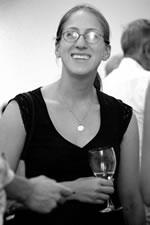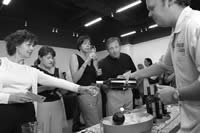The science of wine
Fresno State joins forces with the Fresno Metropolitan Museum to raise
money, educate
By Cindy Gonzales
The sounds of laughter, music and the pop of wine bottle corks filled
the Lyles Theatre in downtown Fresno on Friday night.
A form of artwork was being celebrated: the art of wine.
| 
Fresno State student Krystal Goulart said she has purple stains
on her fingers and clothes from working seven days a week during
the grape harvest season. Photos by Emily Tuck |
Fresno State’s viticulture and enology department joined the Fresno
Metropolitan Museum in presenting “The Science of Wine,” a
wine-tasting and food-pairing experience that incorporated both into a
fun-filled evening.
The workshop allowed more than 100 guests to sample some of the valley’s
best wines from local wineries, including Fresno State’s.
“Tonight is a great representation of the wine we have to offer,”
said Krystal Goulart, a junior double majoring in enology, the study of
making wine, and viticulture, the study of growing grapes.
Robert Wample, the chair of Fresno State’s viticulture and enology
department, and Fresno State professor Ken Fugelsang spoke to the audience
about the art of grape-growing, wine making and the chemistry involved
in both.
“You have to taste, taste, and taste,” said Mike Carey, a
Whole Foods chef who spoke at the event.
Carey said in order to become a proficient wine drinker, you must try
the wine first before purchasing it.
“Sip it, swallow it, swish it, smell it,” Carey said. “Do
anything that makes you taste it.”
Carey spoke to the audience about choosing a wine based on personal tastes
and developing a menu for a meal based on the wine.
He emphasized the importance of recognizing the elements and tastes of
each wine and using that knowledge when trying to pair it with food.
The after-hours event allowed wine-tasting enthusiasts to view the French
Toulouse-Lautrec: Artist of Montmarte exhibit on display.
| 
After graduating from Fresno State in 1999 with his enology degree,
owner and winemaker Bret Engelman (right) developed Engelman Cellars
boutique winery in Fresno. The business sells about 1,500 to 2,000
cases of wine a year. Engelman said he plans to add space for weddings
and entertainment. |
Kurt Gross, director of science programs at the museum, helped create
the evening with help from Whole Foods, which donated the food, and the
local wineries, which provided the wine.
Local wineries included Engelman Cellars, Chateau Lasgoity, Sequoia View
Vineyards and Fresno State.
All proceeds generated from the ticket sales went toward improving the
education programs at the museum.
Goulart knows first hand how difficult it is to make a great-tasting wine.
“You have to be passionate about winemaking,” Goulart said.
“Every step involved is extremely important.”
The purple-stained fingertips on both of her hands and the grape juice-stained
clothing she owns are daily reminders of exactly how hard it is to make
a great-tasting bottle of wine, she said.
During the grape harvest from August to November, Goulart is on call 24
hours a day, seven days a week to help in the wine-making process. She
said harvesting is the busiest time for students and the most crucial
time for grapes in both the fields and the winery.
“When it’s harvest time, the grapes don’t wait,”
Goulart said.
Tish Cooper, a senior enology major, agrees.
“Developing a wine is definitely a challenge,” said Cooper,
who works more than 60 hours a week at Engelman Cellars as tasting room
manager, and in Canadaguia Winery’s analytical chemistry lab.
Cooper said in addition to physical labor, winemaking incorporates aspects
of business, science and art, and that if you fail in any one of these
you fail in the industry.
Wample discussed the new technology and achievements in the winemaking
industry of California and Fresno State. He said students are in the process
of changing the perception of the San Joaquin Valley wineries by taking
valley-grown grapes and turning them into quality products that make quality
wine.
“An artistic ability is required to recognize what you like and
what works best with each variety,” said Barry Gump, a Fresno State
professor of chemistry and enology.
In order to appreciate wine, Gump said, one must have the ability to instinctively
taste all the components in each wine.
He said winemakers and wine tasters who understand chemistry are consistently
better at determining certain qualities and hidden virtues of wine.
|

